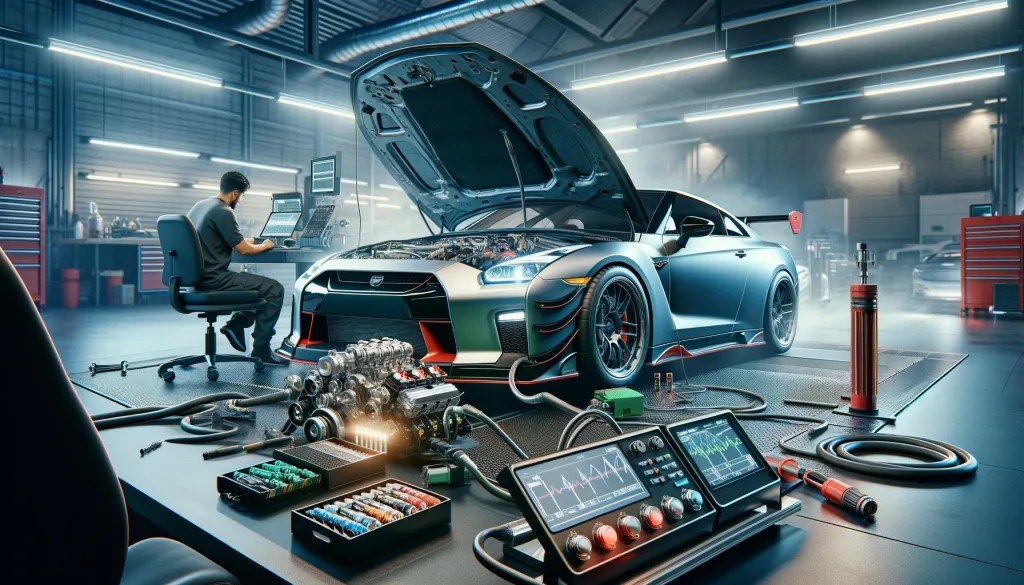Tuning your car is a fascinating journey into the world of automotive performance and personalization. It involves making adjustments to your vehicle’s engine and other components to improve its overall efficiency, power, and handling. Whether you're a car enthusiast looking to squeeze out every ounce of performance or simply someone who wants a smoother ride, understanding the basics of tuning can be incredibly beneficial. This process not only enhances your driving experience but can also extend the life of your vehicle.
In recent years, tuning has become increasingly popular among car owners. With advancements in technology, modern cars are equipped with sophisticated engine management systems that allow for a variety of tuning options. From simple modifications like exhaust upgrades to more complex adjustments such as ECU remapping, there is a wide range of possibilities to explore. This article will guide you through the essentials of tuning your car, answering common questions and providing useful insights.
As you embark on your tuning journey, it's crucial to have a clear understanding of what you want to achieve. Are you looking for a boost in horsepower, improved fuel efficiency, or perhaps a more aggressive sound? Each tuning goal requires a different approach, and knowing your endgame will help you make informed decisions along the way. In the following sections, we will delve deeper into the various aspects of tuning your car, helping you unlock its full potential.
What Are the Key Benefits of Tuning Your Car?
Tuning your car offers a multitude of benefits that can enhance your overall driving experience. Here are some of the most significant advantages:
- Improved Performance: Tuning can lead to noticeable increases in horsepower and torque, giving your vehicle more power on the road.
- Better Fuel Efficiency: With the right adjustments, you can optimize fuel consumption, saving money at the pump.
- Enhanced Handling: Upgrades such as suspension tuning can improve your car's handling and stability, making it more enjoyable to drive.
- Personalized Experience: Custom tuning allows you to tailor your vehicle's performance to suit your unique driving style.
How Do You Start Tuning Your Car?
Starting the tuning process can feel overwhelming, but breaking it down into manageable steps can simplify the journey. Here’s how you can get started:
- Research: Understand the components of your vehicle and the tuning options available.
- Set Goals: Determine what aspects of your car you want to enhance.
- Budget: Assess how much you are willing to invest in the tuning process.
- Consult Professionals: If necessary, seek advice from experienced tuners or automotive specialists.
What Are the Different Types of Car Tuning?
Car tuning can be broadly categorized into several types, each with its own focus and methods:
1. Engine Tuning
Engine tuning involves optimizing the engine's performance through various modifications, such as:
- ECU remapping
- Upgrading air intake and exhaust systems
- Installing performance chips
2. Suspension Tuning
This type focuses on improving the car's handling and ride quality through adjustments to the suspension system. Key modifications include:
- Installing adjustable shocks and struts
- Upgrading sway bars
- Lowering springs
3. Aesthetic Tuning
Aesthetic tuning enhances the visual appeal of your vehicle. This may involve:
- Custom paint jobs
- Upgrading wheels and tires
- Installing body kits or spoilers
4. Performance Tuning
Performance tuning typically encompasses modifications that improve the car's speed and acceleration, including:
- Turbocharger or supercharger installation
- Weight reduction techniques
- Performance brakes
What Tools Do You Need for Tuning Your Car?
Having the right tools is essential for successful car tuning. Here’s a list of basic tools you may need:
- OBD-II scanner
- Torque wrench
- Socket set
- Car lift or jack stands
- Performance tuning software (if ECU tuning)
Are There Risks Involved in Tuning Your Car?
While tuning your car can yield many benefits, it also comes with potential risks. Some of these include:
- Voiding warranties
- Potential damage to engine components if not done correctly
- Legal issues related to emissions and modifications
How Can You Maintain Your Tuned Car?
Once you've tuned your car, maintaining it is crucial to ensure lasting performance. Here are some tips:
- Regular Maintenance: Follow the manufacturer’s guidelines for oil changes, filter replacements, and other routine checks.
- Monitor Performance: Keep an eye on the performance metrics of your tuned components.
- Stay Informed: Stay updated on tuning trends and best practices to continually enhance your vehicle.
Who is a Famous Car Tuner?
One notable figure in the world of car tuning is Ken Block, a professional driver, businessman, and founder of Hoonigan Industries. Known for his incredible driving skills and innovative approach to car customization, Block has made a significant impact on automotive culture.
| Personal Details | Bio Data |
|---|---|
| Name: | Ken Block |
| Date of Birth: | November 21, 1967 |
| Nationality: | American |
| Profession: | Professional Driver, Entrepreneur |
| Famous For: | Gymkhana series, Hoonigan Industries |
In conclusion, tuning your car is an exciting endeavor that can greatly enhance your driving experience. By understanding the various types of tuning, the tools required, and the potential risks involved, you can make informed decisions that will lead to a more personalized and enjoyable vehicle. Whether you aim to improve performance, aesthetics, or both, the world of car tuning offers endless possibilities for every car enthusiast. So, buckle up and get ready to unleash the full potential of your ride!
You Might Also Like
Unraveling The Mystery: Why Did My Tinder Match Disappear?Texas Mom's United Flight Controversy: What Really Happened?
Unlocking The Mysteries: Area 51 Flights
Discovering The Allure Of The Quasi Water Park: A Unique Experience Awaits
Unlocking Your Entertainment: A Guide To Go Foxnation Com Enter Code Fire Tv
Article Recommendations
- Lacey Fletcher Picture
- Vagascom
- Ana Kasparian Net Worth
- Matt Czuchry Wife
- Karlye Taylor Nudes
- Life Below Zero Star Dies
- Diddy
- Ximena Saenz Leak
- Marc Rudolph
- Angela Alvarez Leaked


